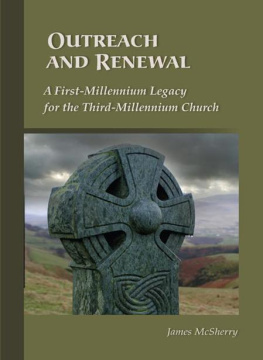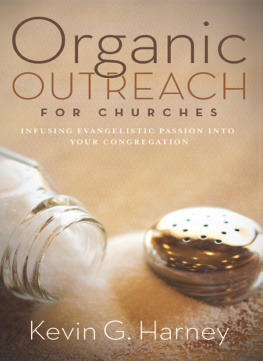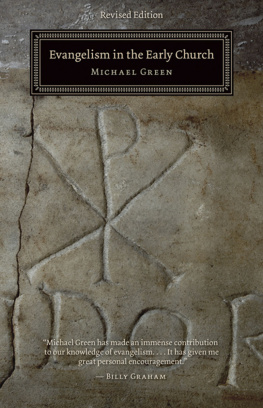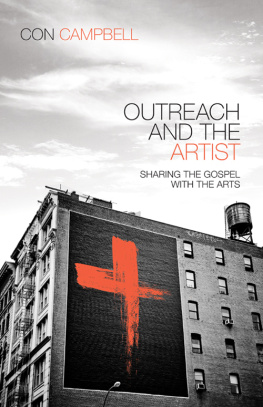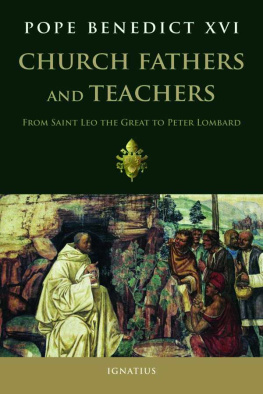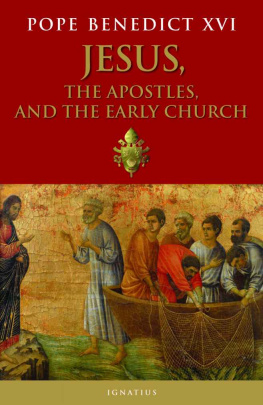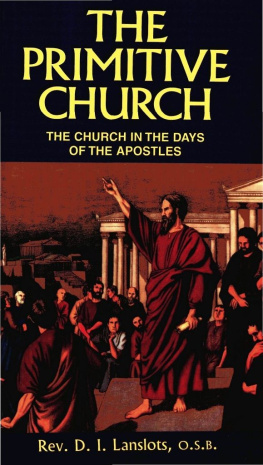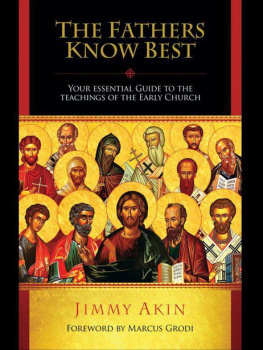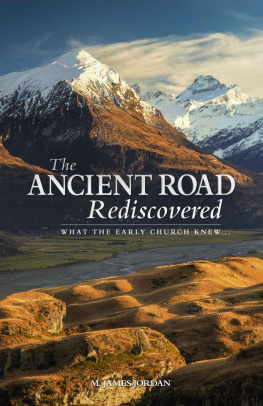OUTREACH AND RENEWAL
CISTERCIAN STUDIES SERIES: NUMBER TWO HUNDRED THIRTY-SIX
OUTREACH AND RENEWAL
A First-Millennium Legacy for the
Third-Millennium Church
James McSherry

www.cistercianpublications.org
LITURGICAL PRESS
Collegeville, Minnesota
www.litpress.org
A Cistercian Publications title published by Liturgical Press
Cistercian Publications
Editorial Offices
Abbey of Gethsemani
3642 Monks Road
Trappist, Kentucky 40051
www.cistercianpublications.org
Scripture texts in this work are taken from the New Revised Standard Version Bible: Catholic Edition 1989, 1993, Division of Christian Education of the National Council of the Churches of Christ in the United States of America. Used by permission. All rights reserved.
Excerpts from King of Mysteries: Early Irish Religious Writings translated by John Carey (Dublin: Four Courts Press, 1998) and Early Irish Lyrics translated by Gerard Murphy (Dublin: Four Courts Press, 1998). Used by permission.
2011 by Order of Saint Benedict, Collegeville, Minnesota. All rights reserved. No part of this book may be reproduced in any form, by print, microfilm, microfiche, mechanical recording, photocopying, translation, or by any other means, known or yet unknown, for any purpose except brief quotations in reviews, without the previous written permission of Liturgical Press, Saint Johns Abbey, PO Box 7500, Collegeville, Minnesota 56321-7500. Printed in the United States of America.

Library of Congress Cataloging-in-Publication Data
McSherry, James.
Outreach and renewal : a first-millennium legacy for the third-millennium church / James McSherry.
p. cm. (Cistercian studies series ; no. 236)
Includes bibliographical references (p. ).
ISBN 978-0-87907-236-0 (pbk.) ISBN 978-0-87907-798-3 (e-book)
1. Church historyPrimitive and early church, ca. 30600.2. Church historyMiddle Ages, 6001500. 3. Fathers of the church. I. Title. II. Series.BR162.3.M427 2011270.1dc22
2010050204
CONTENTS
ABBREVIATIONS
The following abbreviations are used throughout the footnotes:
| ACW | Ancient Christian Writers. Westminster, MD: Newman Press; New York: Paulist Press, 1946. |
| ANF | The Ante-Nicene Fathers of the Christian Church. Grand Rapids, MI: Eerdmans, 1996. |
| CF | Cistercian Fathers Series. Kalamazoo, MI: Cistercian Publications, 1970. |
| CUAP | Catholic University of America Press. |
| ECL | Early Christian Lives: Life of Antony by Athanasius, Life of Paul of Thebes by Jerome, Life of Hilarion by Jerome, Life of Malchus by Jerome, Life of Martin of Tours by Sulpicius Severus, Life of Benedict by Gregory the Great. Translated by Carolinne White. London: Penguin Books, 1998. |
| ECW | Early Christian Writings: The Apostolic Fathers: The First Epistle of Clement to the Corinthians. The Epistle s of Ignatius; The Epistle of Polycarp of Smyrna; The Martyrdom of Polycarp; Didache. Translated by Maxwell Staniforth. Early Christian Writings. New York: Dorset Press, 1993. |
| FCh | Fathers of the Churc h. Washington, DC: Catholic University of America Press, 1948. |
| JB | Jerusalem Bible. |
| NPNF | A Select Library of the Nicene and Post-Nicene Fathers of the Christian Church. Edited by Philip Schaff et al. Gran d Rapids, MI: Eerdmans, 199698; Peabody, MA: Hendrickson, 1999. |
| WF | The Western Fathers: Being the Lives of SS. Martin of Tours by Sulpicius Severus, Ambrose by Paulinus, Augustine of Hippo by Possidius, Honoratus of Arles and Germanus of Auxerre. Translated by F. R. Hoare. New York: Sheed and Ward, 1954. |
PREFACE
S everal years ago I read Daniel Conneelys Letters of Saint Patrick, in which the missionarys work is viewed in the context of the patristic era. The experience led me to revisit a group of spiritual guides whose names and inspiring exploits were common currency until the sixties of the last century but who have fallen from public view in recent times. The fathers of the Church were products of the late classical and early medieval world of a rapidly disintegrating empire. They served a body which was so beleaguered that one of their number, Gregory the Great, feared shipwreck from the storms through which he guided it.
The fathers emulation of the ascetics and association with monasticism inspired their passionate commitment to sharing the Gospel message, defending it against attack, renewing the Church in its decline, and salving the fears and material needs of peoples enduring war, famine, and poverty. While both fathers and ascetics may have been larger than life in their willingness to endure sacrifice and criticism in support of the faith of fellow Christians, they never failed to retain their humanity. Their rich legacy supplies the theme of this study.
I am indebted to the scholars whose lucid assessments of the lives and works of the fathers were consulted during the research process. Their writings led me, in turn, to the translations of the sources on which much of Outreach and Renewal is based. I refer here not merely to monumental series like Fathers of the Church or Ante-Nicene and Post Nicene Fathers, but to the many individual renderings of patristic works acknowledged in the bibliography.
I wish to thank Father Mark Scott, executive editor of Cistercian Publications, for the patience and insight with which he steered the enterprise in the direction of publication. His advice and encouragement, delivered with sensitivity and humor, ensured that Outreach and Renewal advanced much more smoothly and steadily than I could have anticipated. Sincere thanks also to Stephanie Nix, Colleen Stiller, and Lauren L. Murphy of Liturgical Press, valued guides through the demanding final stages of preparation for publication. Finally, not least to my wife Kathleen I express my gratitude for her understanding, tolerance, support, and invariably pertinent observations on the work in hand.
INTRODUCTION
A cts of the Apostles opens with the birth of the Church at Pentecost, when the disciples, filled with the Holy Spirit, answered Christs call to proclaim the good news to the whole creation.
The successors of the apostles continued to praise the beneficent God who had created human beings in his own image and restored them to favor when they fell from grace. They urged the faithful to respond with love, worship, and acceptance of Gods will. Many of these spiritual guides were later acclaimed as fathers of the Church. Most of the fathers were bishops and ascetics; some were martyred in the early persecutions. In the apostolic tradition, they proclaimed the Good News of redemption, and reminded Christians that, as members of a community which is both human and divine, individual believers and the entire body of faithful are in perennial need of renewal.
Aware that human frailty had been a feature of even the apostolic era, the fathers of the fourth century were equipped to counter the decline in faith and religious practice which accompanied the advent of religious freedom. Seeking to support believers and inspire them to persevere in their baptismal commitment, they invoked Gods grace and gave a priestly witness which recalled the example of the martyrs. They also emulated the ascetics who, from the early fourth century, began to leave the imperial cities for the deserts of Egypt, where they served God and neighbor through prayer and self-sacrifice. Recognizing that these individuals were worthy of emulation, fathers like Basil, Jerome, Gregory of Nazianzen, and Ambrose adopted the same simplicity of life and dedication to Gods service. They encouraged bishops and priests to live communally and frugally, sharing their resources in the spirit of the early Church.
Next page
